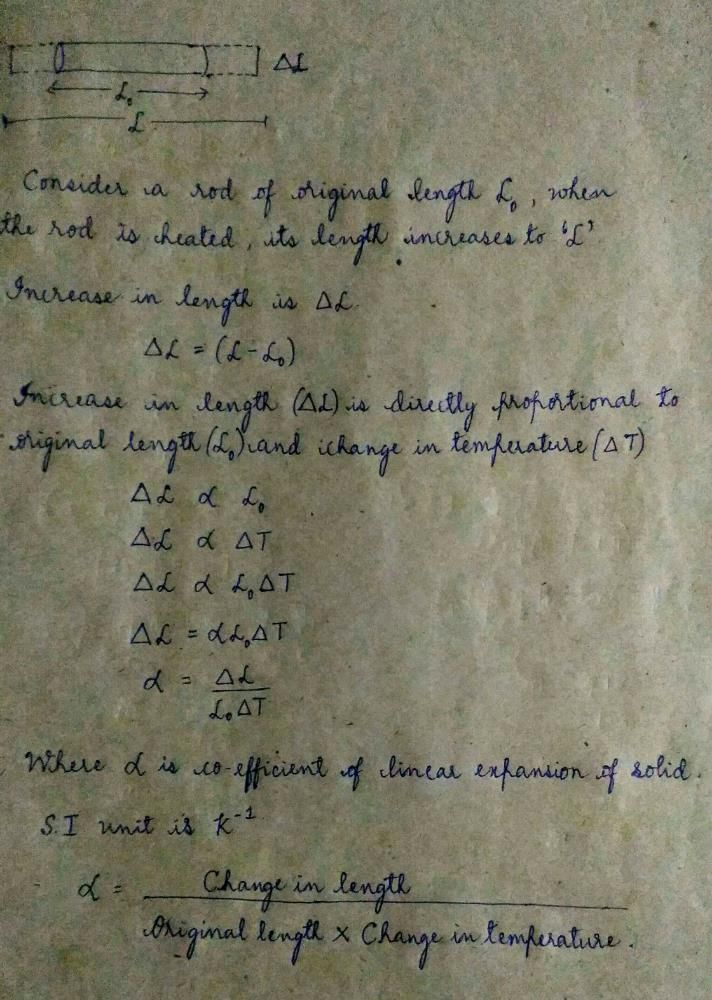Class 11 Exam > Class 11 Questions > Derive the expression of the coefficient of l...
Start Learning for Free
Derive the expression of the coefficient of linear expansion in solid?
Most Upvoted Answer
Derive the expression of the coefficient of linear expansion in solid?

Community Answer
Derive the expression of the coefficient of linear expansion in solid?
Introduction:
The coefficient of linear expansion in solids is a measure of how much a solid expands when heated. It is denoted by α and is defined as the fractional change in length for a unit change in temperature.
Formula:
α = (ΔL / Lo) / ΔT
where ΔL is the change in length, Lo is the original length, and ΔT is the change in temperature.
Explanation:
When a solid is heated, its atoms and molecules vibrate more vigorously, leading to an increase in the distance between them. This results in an increase in the length of the solid. The coefficient of linear expansion quantifies this change.
Factors affecting α:
The coefficient of linear expansion is affected by several factors, including the type of solid, the temperature range, and the presence of impurities. For example, metals typically have higher coefficients of linear expansion than non-metals.
Applications:
The coefficient of linear expansion is used in several applications, including the design of bridges and buildings, the calibration of thermometers, and the manufacture of electronic devices.
Conclusion:
In conclusion, the coefficient of linear expansion in solids is an important property that measures how much a solid expands when heated. It is affected by several factors and is used in various applications.
The coefficient of linear expansion in solids is a measure of how much a solid expands when heated. It is denoted by α and is defined as the fractional change in length for a unit change in temperature.
Formula:
α = (ΔL / Lo) / ΔT
where ΔL is the change in length, Lo is the original length, and ΔT is the change in temperature.
Explanation:
When a solid is heated, its atoms and molecules vibrate more vigorously, leading to an increase in the distance between them. This results in an increase in the length of the solid. The coefficient of linear expansion quantifies this change.
Factors affecting α:
The coefficient of linear expansion is affected by several factors, including the type of solid, the temperature range, and the presence of impurities. For example, metals typically have higher coefficients of linear expansion than non-metals.
Applications:
The coefficient of linear expansion is used in several applications, including the design of bridges and buildings, the calibration of thermometers, and the manufacture of electronic devices.
Conclusion:
In conclusion, the coefficient of linear expansion in solids is an important property that measures how much a solid expands when heated. It is affected by several factors and is used in various applications.

|
Explore Courses for Class 11 exam
|

|
Similar Class 11 Doubts
Derive the expression of the coefficient of linear expansion in solid?
Question Description
Derive the expression of the coefficient of linear expansion in solid? for Class 11 2025 is part of Class 11 preparation. The Question and answers have been prepared according to the Class 11 exam syllabus. Information about Derive the expression of the coefficient of linear expansion in solid? covers all topics & solutions for Class 11 2025 Exam. Find important definitions, questions, meanings, examples, exercises and tests below for Derive the expression of the coefficient of linear expansion in solid?.
Derive the expression of the coefficient of linear expansion in solid? for Class 11 2025 is part of Class 11 preparation. The Question and answers have been prepared according to the Class 11 exam syllabus. Information about Derive the expression of the coefficient of linear expansion in solid? covers all topics & solutions for Class 11 2025 Exam. Find important definitions, questions, meanings, examples, exercises and tests below for Derive the expression of the coefficient of linear expansion in solid?.
Solutions for Derive the expression of the coefficient of linear expansion in solid? in English & in Hindi are available as part of our courses for Class 11.
Download more important topics, notes, lectures and mock test series for Class 11 Exam by signing up for free.
Here you can find the meaning of Derive the expression of the coefficient of linear expansion in solid? defined & explained in the simplest way possible. Besides giving the explanation of
Derive the expression of the coefficient of linear expansion in solid?, a detailed solution for Derive the expression of the coefficient of linear expansion in solid? has been provided alongside types of Derive the expression of the coefficient of linear expansion in solid? theory, EduRev gives you an
ample number of questions to practice Derive the expression of the coefficient of linear expansion in solid? tests, examples and also practice Class 11 tests.

|
Explore Courses for Class 11 exam
|

|
Signup to solve all Doubts
Signup to see your scores go up within 7 days! Learn & Practice with 1000+ FREE Notes, Videos & Tests.



























